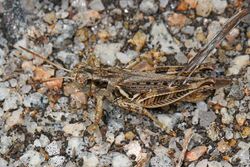Biology:Melanoplus bispinosus
| Melanoplus bispinosus | |
|---|---|

| |
| Melanoplus bispinosus, Harris Neck National Wildlife Refuge, Townsend, Georgia | |
| Scientific classification | |
| Domain: | Eukaryota |
| Kingdom: | Animalia |
| Phylum: | Arthropoda |
| Class: | Insecta |
| Order: | Orthoptera |
| Suborder: | Caelifera |
| Family: | Acrididae |
| Genus: | Melanoplus |
| Species: | M. bispinosus
|
| Binomial name | |
| Melanoplus bispinosus Scudder, 1897
| |
Melanoplus bispinosus, the two-spined spurthroated grasshopper, is a species of grasshopper belonging to the genus Melanoplus. This grasshopper is native to the United States.[1]
Distribution and habitat
Melanoplus bispinosus is commonly found in the southeastern United States, in states such as Florida, Alabama, and Georgia.[1] This grasshopper can be found in woody habitats, but it is associated more with open and disturbed areas. These disturbed areas are usually found in roadside areas or fields in the first stage of ecological succession.[2] These areas are typically dominated by grasses and forbs. Adults can be found throughout the summer and into the fall.[3]
Diet
These grasshoppers are mixed feeders, so their diet consists mainly of grasses and forbs, which are readily available in their habitat.[2]
Identification
This grasshopper is medium-sized and is a grayish-brown to reddish-brown color. There is a dark stripe that extends from the eye to the lateral lobe of the pronotum.[3] There is a row of dark spots on the forewing that extends to the top of the abdomen. The hind femora (third segment of leg) have large dark spots or bands and the hind tibiae (fourth segment of leg) is blue or blue-green.[3] The body length of a male is approximately 24.5 mm and a female is approximately 31.5 mm.[4] This grasshopper gets its name from the presence of a large spine-like furcula. In males, the extensions of the furcula extend to one-half the length of the supra-anal plate and are slightly divergent. The cerci are elongated, narrow in the middle, and rounded at the end.[3]
References
- ↑ Jump up to: 1.0 1.1 "Comprehensive Report Species - Melanoplus bispinosus" (in en). http://explorer.natureserve.org/servlet/NatureServe?searchName=Melanoplus+bispinosus.
- ↑ Jump up to: 2.0 2.1 Smith, Trevor Randall; Capinera, John L. (2005-02-01). "Host Preferences and Habitat Associations of Some Florida Grasshoppers (Orthoptera: Acrididae)". Environmental Entomology 34 (1): 210–224. doi:10.1603/0046-225X-34.1.210. ISSN 0046-225X.
- ↑ Jump up to: 3.0 3.1 3.2 3.3 Capinera, John; Scott, Ralph; Walker, Thomas (2004). Field guide to grasshoppers, katydids, and crickets of the United States. Ithaca, NY: Cornell University Press. pp. 116–117. https://archive.org/details/fieldguidetogras00capi.
- ↑ Scudder, Samuel Hubbard (1897-01-01) (in en). Revision of the orthopteran group Melanopli (Acridiidae): with special reference to North American forms. Govt. print. off.. https://play.google.com/books/reader?id=NeFHAQAAIAAJ&printsec=frontcover&output=reader&hl=en&pg=GBS.PA293.
External links
- Two-Spined Spurthroated Grasshopper, BugGuide
Wikidata ☰ Q10580556 entry
 |

